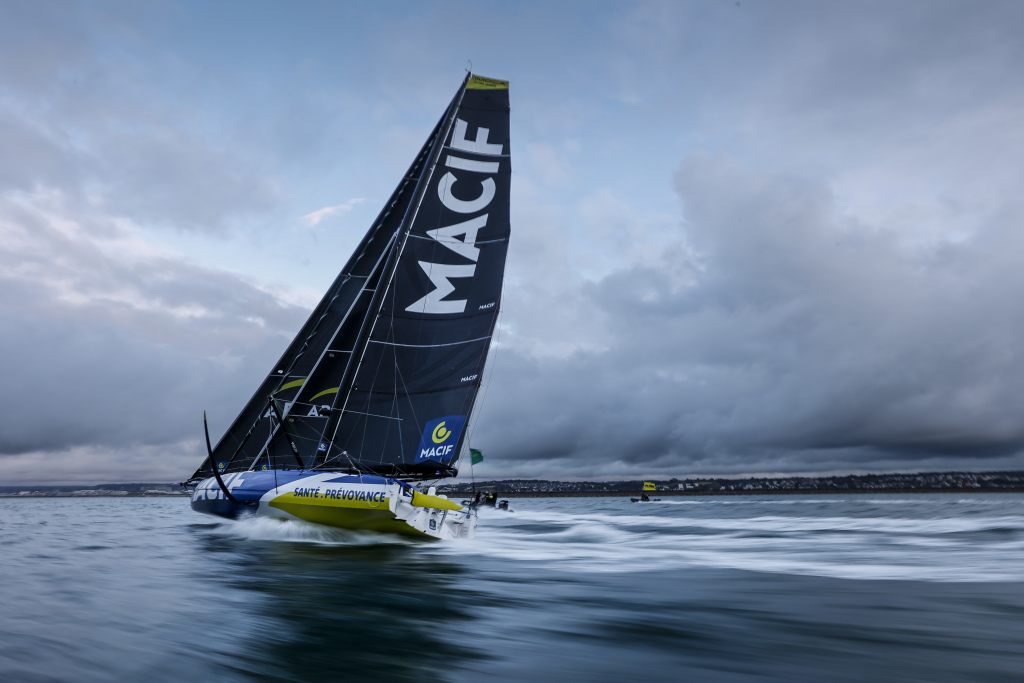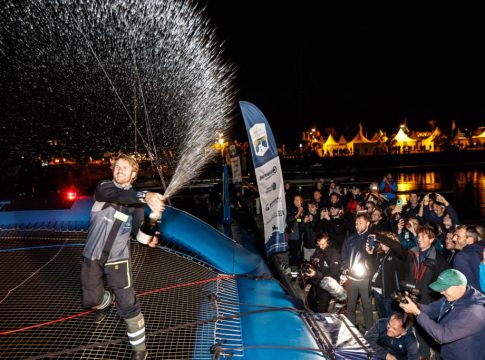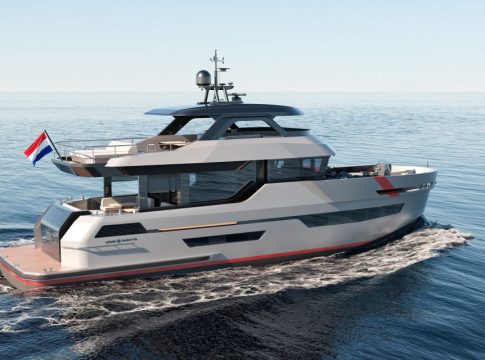With the next Vendée Globe taking place next year, so the IMOCA turn-out for this year’s special 50th edition of the Rolex Fastnet Race featured an impressive 29 boats, including much new hardware.
These included reigning IMOCA class champion Charlie Dalin and Pascal Bidegorry on MACIF Santé Prévoyance. They had just five days of practice on board their new CDK-built Verdier design prior to their delivery to Cowes. But this was a lot compared to Yoann Richomme and Yann Elies on their equally new Groupe Finot design, Paprec Arkéa, which competed in a short inshore event only to uncover structural issues that forced them back into the shed. They came from relaunching straight to the Rolex Fastnet Race start line.
Sailing doublehanded with giant foils and enclosed cockpits restricting their view outside, the latest IMOCAs are not designed for short tacking in confined waters, especially not upwind in 25 knots like Rolex Fastnet Race competitors endured in the Western Solent after the start on Saturday afternoon.
MACIF Santé Prévoyance was first to exit the Solent alongside Jeremie Beyou and Franck Cammas on Charal and rather than diving straight across to the French coast as they did in 2021, instead they played the shifts and current close to the English coast. Paprec Arkéa was first of the group heading south after the Needles to tack west, crossed ahead of the group that had exited the Solent via the North Channel. She was first past Start Point, slowly extended her lead until heading up the east side of the Land’s End TSS where she performed a horizon job on the trio chasing her – MACIF, Charal and Britain’s Sam Goodchild and Antoine Koch on For The Planet. Out into the Celtic Sea she was 18 miles ahead.
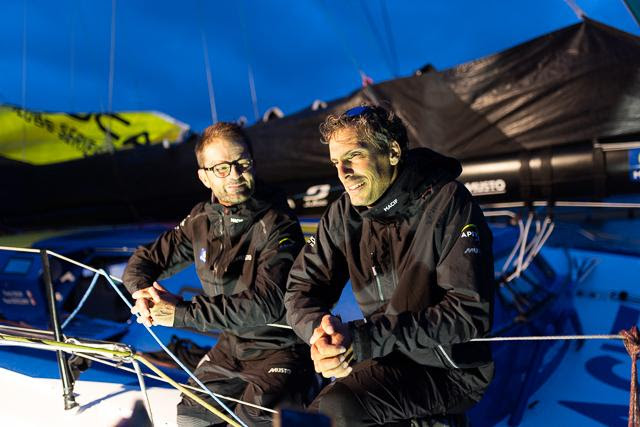
Charlie Dalin (right) and Pascal Bidegorry on MACIF Santé Prévoyance © Arthur Daniel/RORC
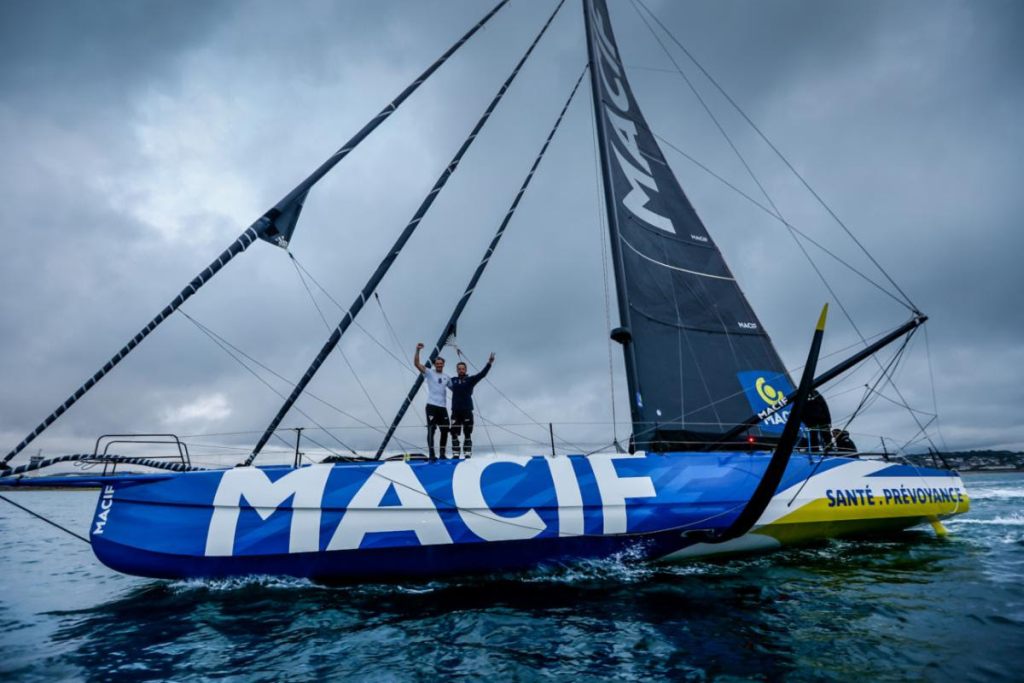
The winner MACIF Santé Prévoyance is a brand new IMOCA © Paul Wyeth/pwpictures.com
This was not to last as those astern closed in. Thus Paprec Arkéa rounded the Fastnet Rock at 21:14 on Sunday night with MACIF 19 minutes 40 seconds behind her and with For the Planet a further 27 minutes 50 seconds behind. Then on the run back to Bishop Rock MACIF ate into all of Paprec Arkéa’s lead. From the Scilly Isles, which they passed at 0500 this morning, and for the remainder of the race, the lead duo were locked in an intense match race. This was complicated as the wind continually died and leaving them to claw their way through the final miles against a powerful foul tide in little wind to reach the finish line.
MACIF Santé Prévoyance crossed the finish line at 20:31:26 BST a mere four minutes six seconds ahead of her rival with compression in the fleet causing the first six to arrive within 45 minutes.
Significantly both the lead IMOCAs beat Bryon Ehrhart’s 88ft Lucky, even with the additional 30 minutes due to IRC Super Zero having started later. Thus MACIF Santé Prévoyance won monohull line honours, the first time an IMOCA has ever done so. Her elapsed time of 2 days 7 hours 16 minutes 26 seconds also established a new race record to Cherbourg, beating the ClubSwan 125 Skorpios’ 2021 time of 2 days 8 hours 33 minutes and 55 seconds, an improvement of 1 hour 17 minutes 29 seconds.
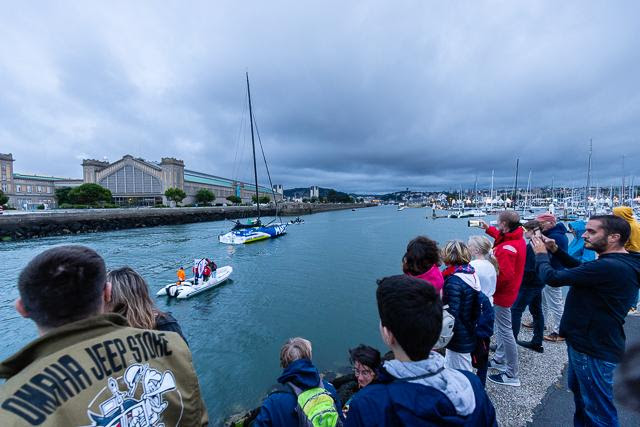
Spectators welcome the arrival of MACIF Santé Prévoyance after the finish © Arthur Daniel/RORC
“It was a very intense race from the first second, going upwind in 30+ knots in the Solent,” said Dalin. “It was incredible with the big waves and winds getting out of the Channel. Then there was the leg from the Fastnet to the Scillies when we reached almost 40 knots several times – crazy speeds – the boat just flying. Then the crazy battle at the end with Yoann and Yann. We caught them, they took off again, we caught them again and managed to overtake and then when we’d got a two-mile lead, we got some seaweed on the keel! Finally we got rid of that and extended again to the finish.”
Dalin paid tribute to his team and his co-skipper: “It’s quite hard to describe how talented and skilled they are. I thought I would be using a toolbox most of the way but we saw we had boat speed and didn’t have to – it’s just incredible. I’m really happy. Pascal and I formed a really good team – he is exceptionally talented.” He added that he had not been worried about the first night’s big conditions because the IMOCAs are designed for it and they hadn’t been leaping off waves.
Paprec Arkéa’s crew was also pleased with how their race had gone, even if they had lost the final match race. “Our boat behaved really well. We had some reinforcements put in before the race which was a good choice as we had no major technical issues which was great,” said Richomme. IMOCA veteran Yann Elies added that he was impressed with how fast the new generation of IMOCAs are upwind. “We are as fast as a multihull, doing nearly 18-20 knots in 3m waves.” On the run back from the Fastnet Rock they had seen 37 knots of boat speed. Richomme noted that their rival’s take off speed when foiling was perhaps in 13 knots compared to 17-18 knots for themselves. “The step from the last generation to this is big. They are a lot more seaworthy than the first generation.”
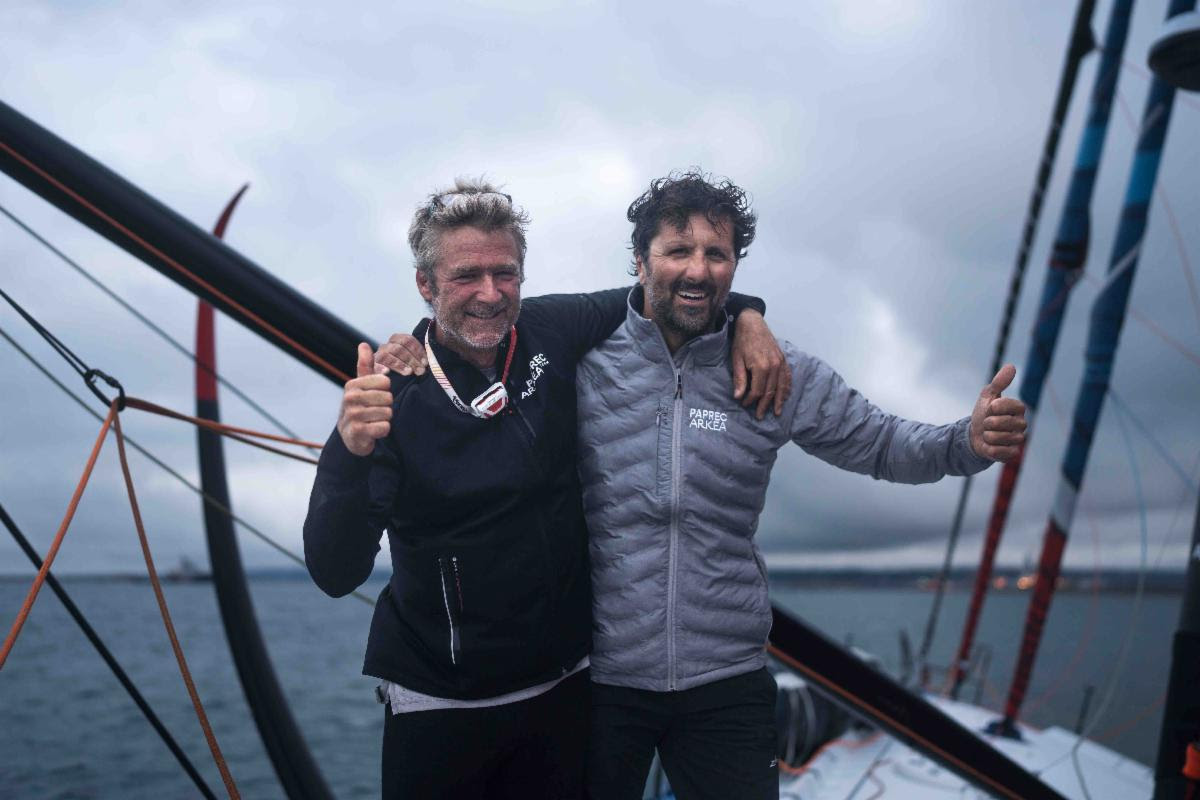
Yoann Richomme (right) and Yann Eliès on Paprec Arkéa © Theo Dolivet-David @ Polaryse
Third in one of his first major IMOCA races came as a welcome surprise for Sam Goodchild. “It’s not really what we expected, so it was good! We started sailing this boat in April. In our first race there were 12 boats and we finished third. Our second race, with 29 boats we didn’t expect to also finish third, but we’ll take that.”
He continued: “To get out of the Solent we did about 20 tacks because the tide was against us at the start but it went well and everyone was respectful and well behaved. Out into the Channel it was a bit rougher, but the boats are designed for that, so it’s less worrying and its good for me to reassure myself that the boats are capable of that. Then it was about trying to find a rhythm; what works, what doesn’t work, because there are a lot of things to play with on these boats between water ballast, keels, foils, sail shapes and sizes, etc.”
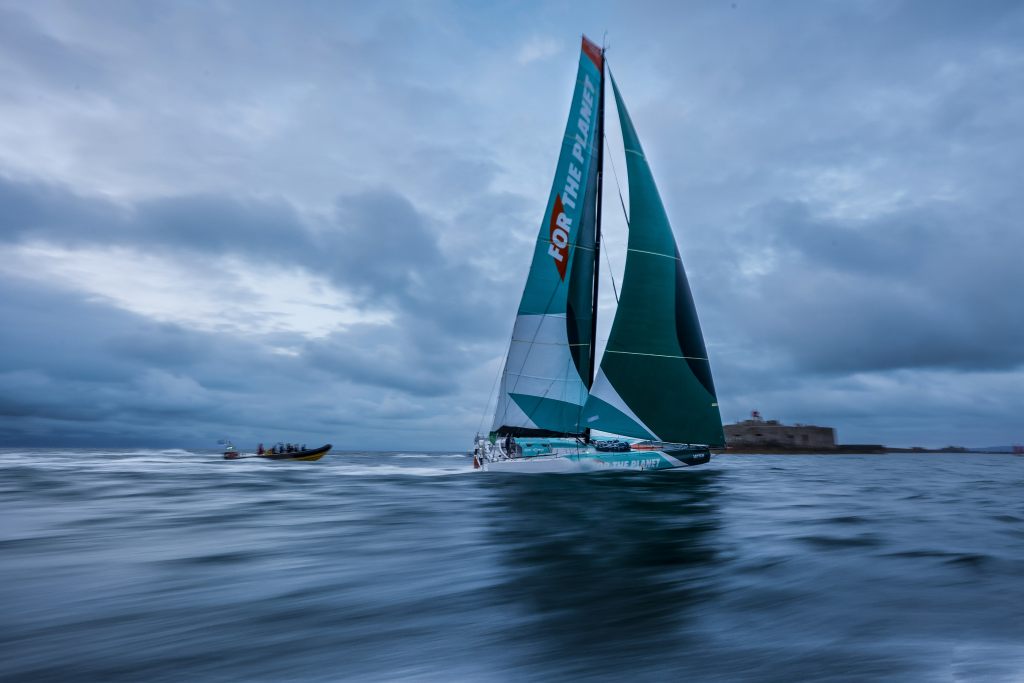
Sam Goodchild and Antoine Koch finished third on For The Planet © Paul Wyeth/pwpictures.com
According to Goodchild, the blast back from the Fastnet Rock proved to be in 35 knots when the forecast had indicated 25. “So we had the wrong sails up and had to deal with that. We hit 37 knots at one stage, I think we were averaging well over 25/26 knots. Then coming back up the Channel, none of the forecasts were clear. We headed into light winds and then everyone else behind us caught up so there was a bit of compression which was frustrating, but we managed to hold onto it and sail a tidy race.”
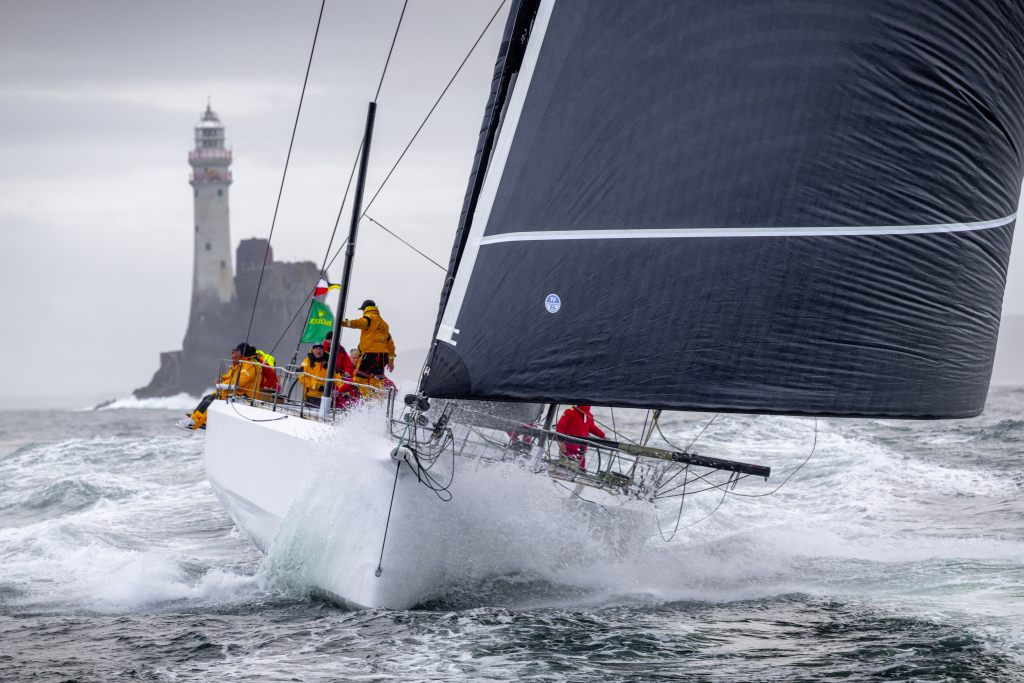
Bryon Ehrhart’s Lucky at the Fastnet Rock © ROLEX/Kurt Arrigo
Bryon Ehrhart’s Lucky finished at 21:16:26 and so missed out on claiming line honours by just 15 minutes. The crew, led by America’s Cup legend Brad Butterworth had thrown everything at it including gybing their way east to the north of the Channel Islands as the IMOCAs hugged the south side of the Casquets TSS. “It was really impressive to see the IMOCAs up close and watch what they’re capable of. It’s a great race course with a lot of challenges. The new course [to Cherbourg] is fantastic. What a great place and I hope to bring my wife over from the USA for the prizegiving later this week. This race has been an incredible experience. The conditions soon after the start were heinous and this boat has never raced with a J6 headsail and three reefs in the mainsail before. It took every ounce of seamanship we had to keep the boat in one piece but eventually we got out of the survival phase and into true racing. And I have to say the racing was really, really good. Rounding the Fastnet Rock again was very special and some of the conditions after that were so exhilarating.”



